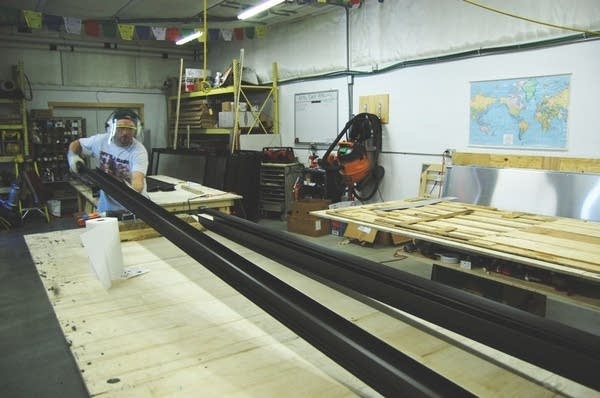Sun powers heaters for low-income families
Go Deeper.
Create an account or log in to save stories.
Like this?
Thanks for liking this story! We have added it to a list of your favorite stories.

There's a modern building that seems out of place here in a clearing in the woods.
It's the Rural Renewable Energy Alliance's headquarters near the small town of Pine River.
The front of the building is a flash of reflected sunlight. The first floor is made of 20 foot high windows. On top is a wall of solar collectors.

"We tried to make the collectors like Legos, so that we can simply snap them together," said Jason Edens, the director of the Energy Alliance.
Turn Up Your Support
MPR News helps you turn down the noise and build shared understanding. Turn up your support for this public resource and keep trusted journalism accessible to all.
Eden's non-profit group designed these solar collectors. They look like big blue windows and they provide heat for the building.
The collectors are made in a shop in the back of the building. That's where Bob Jones is getting ready to slice through a piece of aluminum.
"I'm going to be cutting the outer rail, with is the outer perimeter of the collectors," Jones said.
Let's provide families with a lasting solution that's site based, and empower families with the ability to provide for their own heat with a clean technology.
It's pretty easy to build the solar collectors and the heating system.
They're essentially an insulated aluminum box with layers of glass that collect sunlight. These aren't the kind of solar panels that create electricity. They actually use the power of the sun to warm air, which is then circulated throughout a home by fans and ductwork.
Edens says the system operates like a typical home furnace.
"We wanted to work with a technology that is elegant, it's simple, it's easy to understand, it's accessible," he said. "Solar air heat is a very simple technology."
It may be simple, but it's still expensive. Depending on the size of a home, installing one of these solar heating systems can cost anywhere from $6,000 to $10,000 dollars.
That makes the Energy Alliance's effort even more unusual. The group is going to install these systems free of charge for 50 low income homeowners in Northern and Central Minnesota over the next several months.

"...which is a rather novel concept because generally solar is a very expensive technology," Edens said. "So we're trying to turn that whole notion on its head and make it something that's universally accessible."
The project is possible because of money from private foundations and from the state. The Minnesota Department of Commerce is helping to pay for the solar heat systems from a pot of money that's used to fund home weatherization.
Mark McLaughlin coordinates technical training for the Department of Commerce's weatherization program. He said it makes sense to put the solar units in homes where residents rely on money from the government to pay heating bills.
"What that does is it's also going to reduce their need for other heating fuels like, oil, natural gas or propane," McLaughlin said. "This is going to help lower their heating costs."

In order to get state funding for a solar heater, homeowners need to qualify for government heating assistance. Their home also needs to be weatherized first. And, of course, they need a home with access to lots of sunlight.
The solar heaters will provide only about a quarter of a home's heating needs. But Edens said that's enough to make a real dent in the amount of fuel and money needed to heat a home.
"Let's provide families with a lasting solution that's site based, and empower families with the ability to provide for their own heat with a clean technology," he said.
That's good for the environment, and Edens said it's also good for taxpayers who fund the $75 million dollars of heating assistance given out every year in Minnesota.
Only low income homeowners are eligible to get one of the solar heating systems free of charge. But Eden's group will sell the systems to anyone willing to pay the $6,000 to $10,000 cost.
In fact, he said, that money will help his non-profit install solar heaters in even more low income homes.



